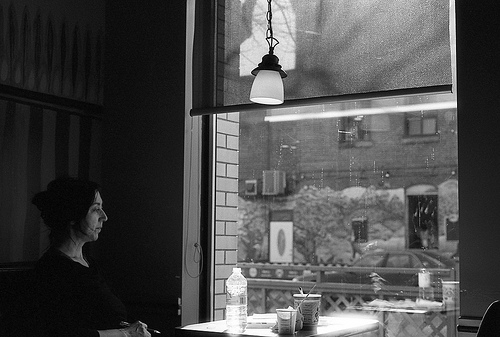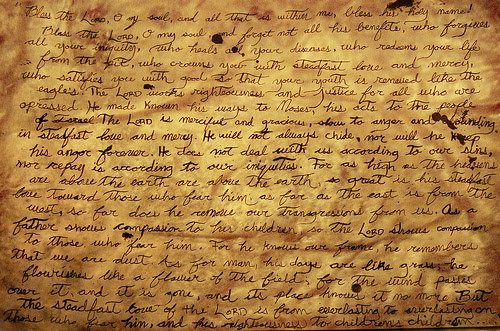The question is inevitable. You're at a get-together and someone asks you, "So, what do you do?"
Fair question, right? Then why do I feel so sheepish?
Here's me: Um, well, I guess ... I
write.
Usually my interlocutor is interested. "Oh, how fascinating! What do you write?"
Ah, there it is. THE QUESTION. I used to say I was a genre writer but, inevitably, people looked at me blankly and asked, "What's that mean?".
So I thought, well, just pick a genre, something most folks are familiar with, something which more or less describes what you write. If they're interested you can refine the description later. So here's what I said.
"I write fantasy"
My questioner flushed and took half a step toward me. "You mean, like,
dirty books?" they whispered.
Back to the drawing board.
Here's my current response: Think Buffy the Vampire Slayer without vampires.
So far it's worked, everyone I've spoken with has either watched Buffy or at least knows what I'm talking about. If they don't--this only happened once--I wave my hand in front of me and say, "Oh, you know, Joss Whedon's stuff". They understand that, or at least feel they
should, and so change the subject.
Paranormal Romance Versus Urban Fantasy
If my experience at parties is any guide, most non-writers aren't familiar with the names of the genres they enjoy. And that's just fine. But we're writers and names can make a huge difference.
If you've written a horror novel and it's mistakenly categorized as paranormal romance chances are many readers who buy it won't be happy and may even leave disgruntled reviews.
Not good.
Here's how I think of the difference between these two genre:
Paranormal romance
A paranormal romance is fundamentally a romance. In the beginning of the story the lovers-to-be meet each other, are powerfully attracted to each other, but there is a reason, a very good and perhaps tragic reason, why they can't be together.
This reason, whatever it is, complicates their lives in various ways until the midpoint of the story when either things change slightly or they throw caution to the winds and, er,
connect. It turns out that being together was a bad idea, but perhaps for an all new set of reasons, and the would-be lovers are separated until the 3/4 point when our couple finally admits to themselves and each other that they are hopelessly in love.
Unfortunately, though, for 'a very good reason' (tm)--often something to do with a greater good--they must now say goodbye. Forever. Fortunately, just before all hope is lost and the two are irretrivably severed from each other and all hope of happiness fades the problem is solved and our lovers fall into each others arms and, probably, beds, and live together happily ever after (HEA). The End.
What do you mean, I must have read a lot of paranormal romances? ;) Of course I have, they're great! I especially like
Katie MacAlister.
My description, above, was tongue-in-cheek, but I tried to hit some of the plot points a romance story needs to cover. A much better description can be found here:
Xtranormal: How To Write A Romance Novel. That's the structure. That's the skeleton of every romance novel, paranormal or otherwise, ever written.
What's paranormal about paranormal romance?
Generally what makes a romance a
paranormal romance is the addition of paranormal abilities. One or more of the characters have abilities that are considered "beyond the scope of normal scientific understanding" (Google Dictionary).
According to Wikipedia, a
paranormal romance blends together, "themes from the genres of traditional fantasy, science fiction, or horror". That seems about right. No category these days is rigidly defined, but that seems to capture the expectations of readers when they pick up a book they've been told is a paranormal romance.
Urban Fantasy
Urban fantasy is the gritty bulked-up cousin of paranormal romance. Where a paranormal romance is fundamentally a romance, an urban fantasies is fundamentally a fantasy. There is a LOT of variation within the fantasy genre and so there is a lot of variation in urban fantasy. That said, it does have some unique aspects.
1) An urban fantasy must be ... well, urban
The bulk of the story has to take place in a city. The urban fantasies I've read generally take place in the cities of today, but in a world where we've realized that vampires and witches and werewolves (oh my!) exist.
That said, the city could be one from the past or the future, or it could be on another planet entirely.
2) An urban fantasy must have paranormal elements
Like a paranormal romance, an urban fantasy will have one or more characters who have abilities that are considered beyond the scope of normal scientific understanding. Being such as witches and werewolves, demons and vampires.
3) In an urban fantasy the outer goal of the protagonist IS NOT the love interest
In a romance the outer goal of the protagonist is the love interest; it is their bond, their eventual union.
Recall the structure of a romance I discussed, above. If this is the structure of a book that has been shelved in the urban fantasy section then the book has been misshelved. That book is NOT an urban fantasy, it's a paranormal romance.
In an urban fantasy something OTHER than the love interest is the protagonist's main goal.
Example: Jim Butcher's book
Changes (The Dresden Files series)
In
Changes Harry Dresden's outer goal is to save his daughter's life. I chose this book because the protagonist's goal is clear cut (and because it's a great book!). The red court vampires are going to ritually sacrifice his daughter unless Harry does something about it. The rest of the book is Harry doing something about it.
Changes is
also the book where ... okay, no spoilers. But, as in most of the Dresden File books, there is a romantic element, a romantic subplot, but this romantic element is decidedly secondary (as one would expect) to saving his daughter's life. So it's usually there, but it's never the main thing.
Clear as mud? :-)
Okay, I've rambled on enough for today, talk to you again tomorrow. I studiously worked away on my NaNoWriMo manuscript and am now at 16,036 words and ever single word I typed was painful! lol Yesterday was NOT a fun writing day, hopefully today will be better. I want to reach 18,000 words by the time I go to bed.
Keep the NaNoWriMo faith! WE WILL FINISH!!
Other articles you might like:
-
A NaNoWriMo Pep Talk From Neil Gaiman
-
David Mamet On How To Write A Great Story
-
How To Earn A Living As A Self-Published Writer
Photo credit: "
Nosferatu (1922)" by
twm1340 under
Creative Commons Attribution ShareAlike 2.0.













